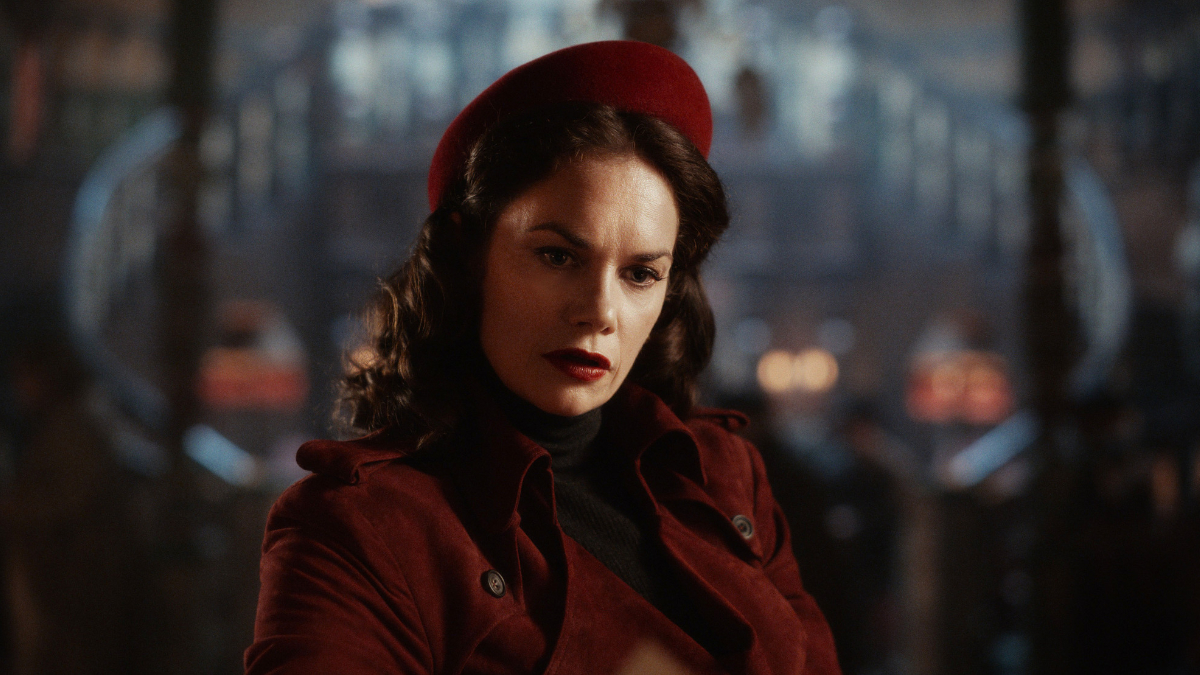This His Dark Materials review contains spoilers.
Only the Authority can know the mysteries of the world! One world! One world! You can’t control the weather!
With each pronouncement, the Magisterium’s relationship to the truth grows more and more distant. From our position in mid-November 2020, His Dark Materials’ vision of a dangerous yet increasingly impotent force flailing to keep a grip on power by denying reality couldn’t feel more timely if Cardinal Hughes had spent the episode ALL CAPS Tweeting.
The Magisterium may not be able to control the weather, but somebody can, and that somebody was pulling this episode’s strings. In the opening scene, we glimpsed a hooded, spell-casting figure summoning Lee Scoresby by changing his course. Presumably it was that same figure who conjured up the conditions to temporarily ground Mrs Coulter’s airship and throw her into his path. Resurrection really does come in the strangest forms.
The prison cell scene was the episode highlight. It offered a rich insight into the character of Mrs Coulter and her push-pull love for Lyra. When she asked Lee to keep her daughter safe, she seemed in part to be asking him to protect Lyra from her, recognising the threat she poses. That woman. Complicated doesn’t begin to cover it.
Anyone entranced by Ruth Wilson’s performance in His Dark Materials (so, anyone who’s seen Ruth Wilson’s performance in His Dark Materials) will have asked ‘why?’ Why is Mrs Coulter so malevolent? Why doesn’t her daemon speak? Why is she deliberately cruel to it – and by extension, herself? Why, when it would cause untold distress to anybody else in her world, can she bear to be physically apart from it? Why the obsession with sealing childhood innocence away from adulthood? What. Is. Mrs. Coulter’s. Damage?
This adaptation has been inching towards an answer ever since it showed Marisa setting upon her soft furnishings like a wild animal in season one. In ‘Theft’ it made a convincing suggestion: she’s a survivor of childhood abuse and her emotions remain warped by early trauma. Her repression and self-punishment, her damage-response detachment from her soul, her intense feelings of shame… psychologically, it’s an explanation that works, and a thematically appropriate one in a story about childhood, freedom, control and oppression. Lee buried his past pain in an itinerant life driven by adventure and love; she buried hers under a malicious quest for power.
In that wholly engrossing scene between Wilson and Lin-Manuel Miranda, Marisa strode into the cell ready to swing her Magisterium-backed weight around, but left it disarmed. Facing the wall, silently accepting the comforting hand of her daemon (is that the first genuine affection she’s allowed between them?), she went from villain to… well, hardly an ally, but the type of character who’s capable of surprising us.
Thanks to Mrs Coulter, Lee’s search for Stannislas Grumman continues. Next for him is a boat up the Yenisei river. Next for her is a visit to Lord Boreal.
There’s a Bond villain vibe to Ariyon Bakare’s Boreal, from his suits to his fancy Tesla to his plush pad (fun fact from the creative team: if you overlay maps of Will’s Oxford and Cittàgazze, Boreal’s house is on the exact same spot as the Tower of Angels in the other world). And check out that collection. Like a 19th century colonial explorer or a 21st century player of Animal Crossing, he’s been journeying to new lands and bringing home whatever takes his fancy. The knife is next on his list, and now he’s trapped Will into retrieving it. If he wants to find his father, first he needs the knife.
Speaking of explorers – how heart-warming to see a bit of Mr Brown and Paddington (another Framestore animation joint, though apparently not their idea to include here) in the cinema. Pan’s face as he watched another creature step between worlds on screen was a picture. The film made good camouflage for Lyra’s confession about Roger, avoiding a sense of repetition with the speech she gave Mary last episode.
We’re still Team Mary, especially after she instantly sided with Lyra over the police officer with the “wonderful moustache”. Her goodness shone when, given the opportunity to pose a question to the all-knowing Dust, the first thing she thought to ask was whether Lyra was safe.
Is Lyra safe? Hardly, but as we heard in that discussion between Kaisa and Iorek (a surprise cameo from the Panserbjørn king), the fate of the world rests with her, which means that for every powerful enemy, she has a powerful ally. Sometimes, as we saw this episode, they’re one and the same.
